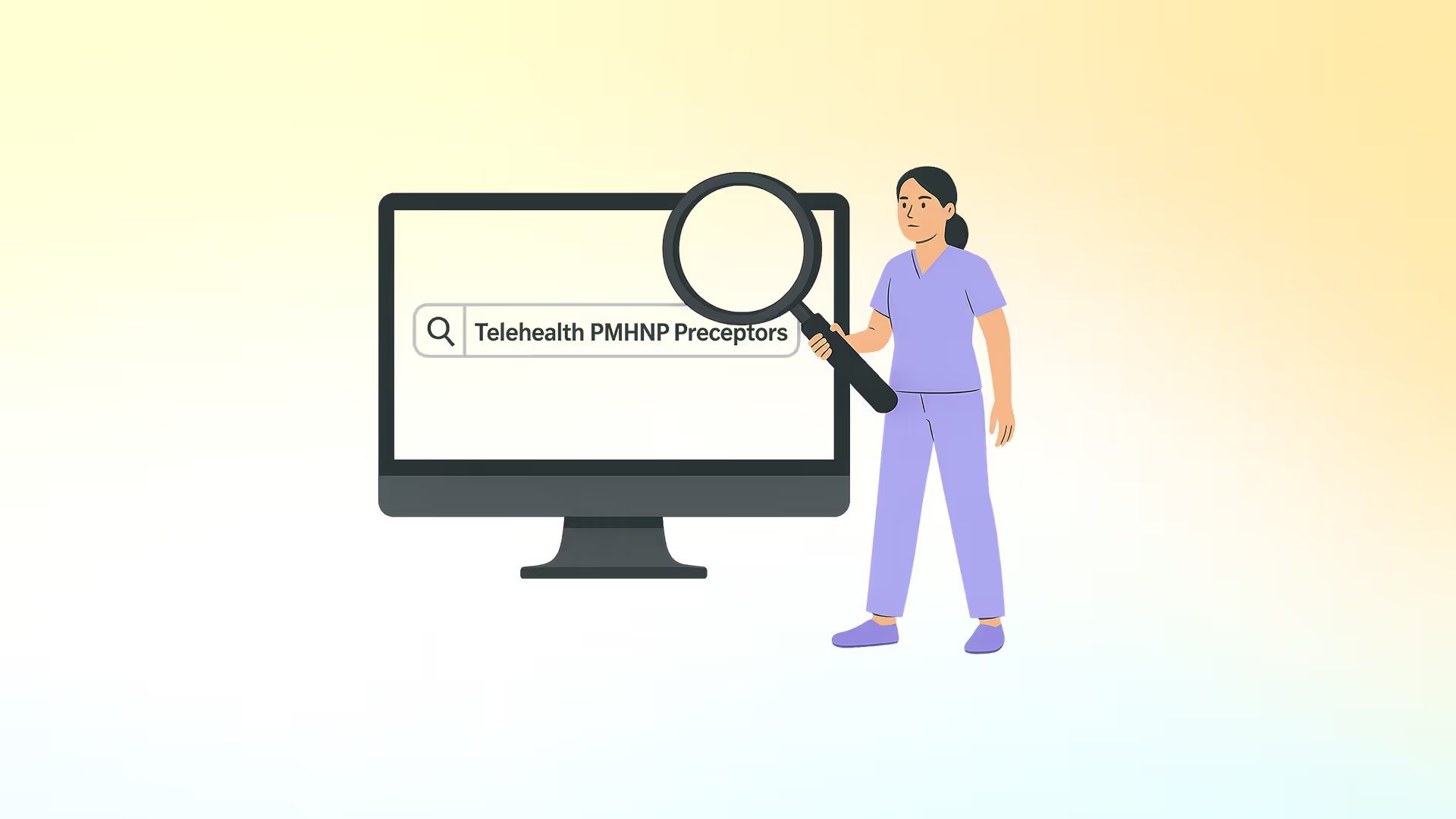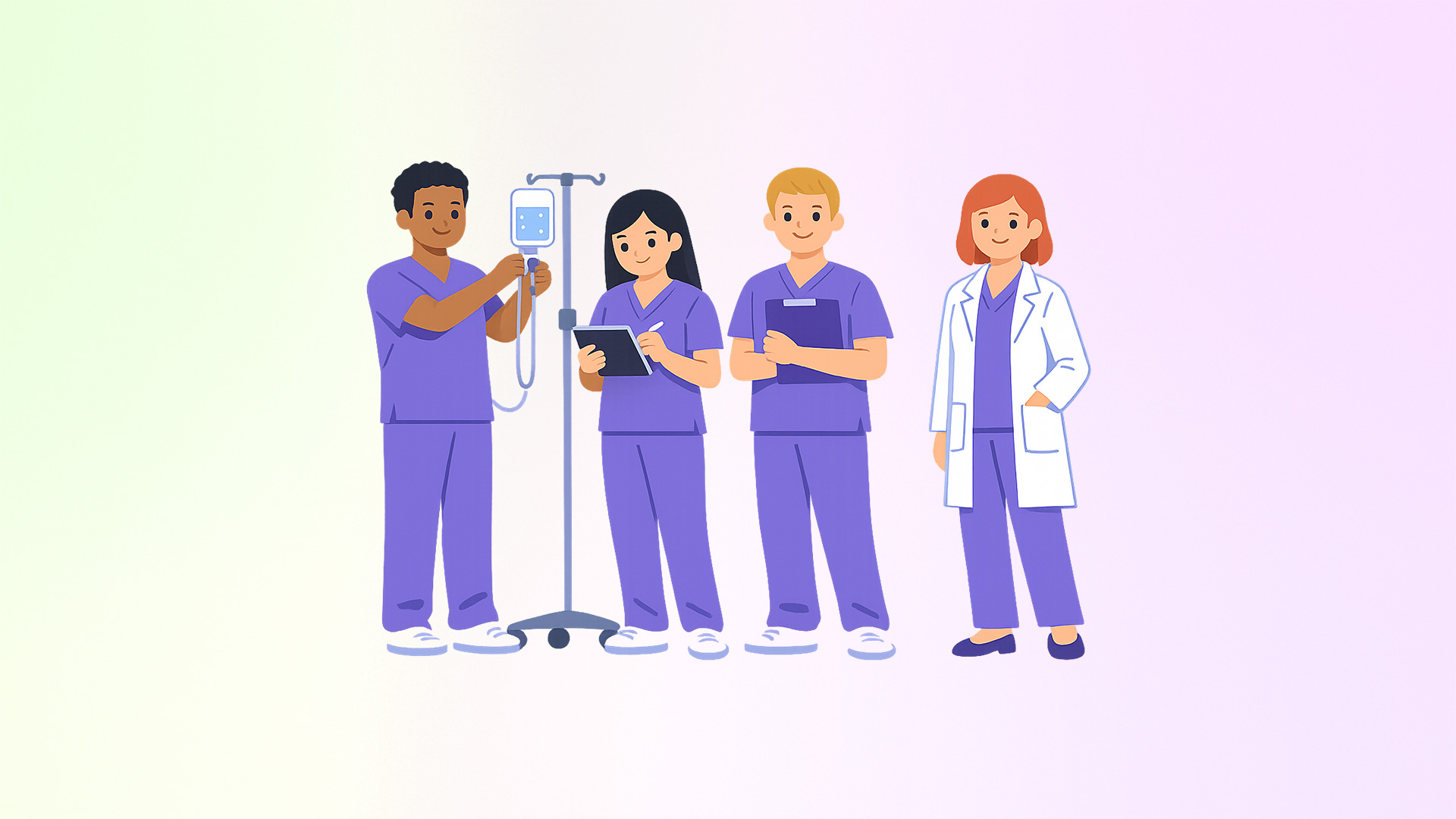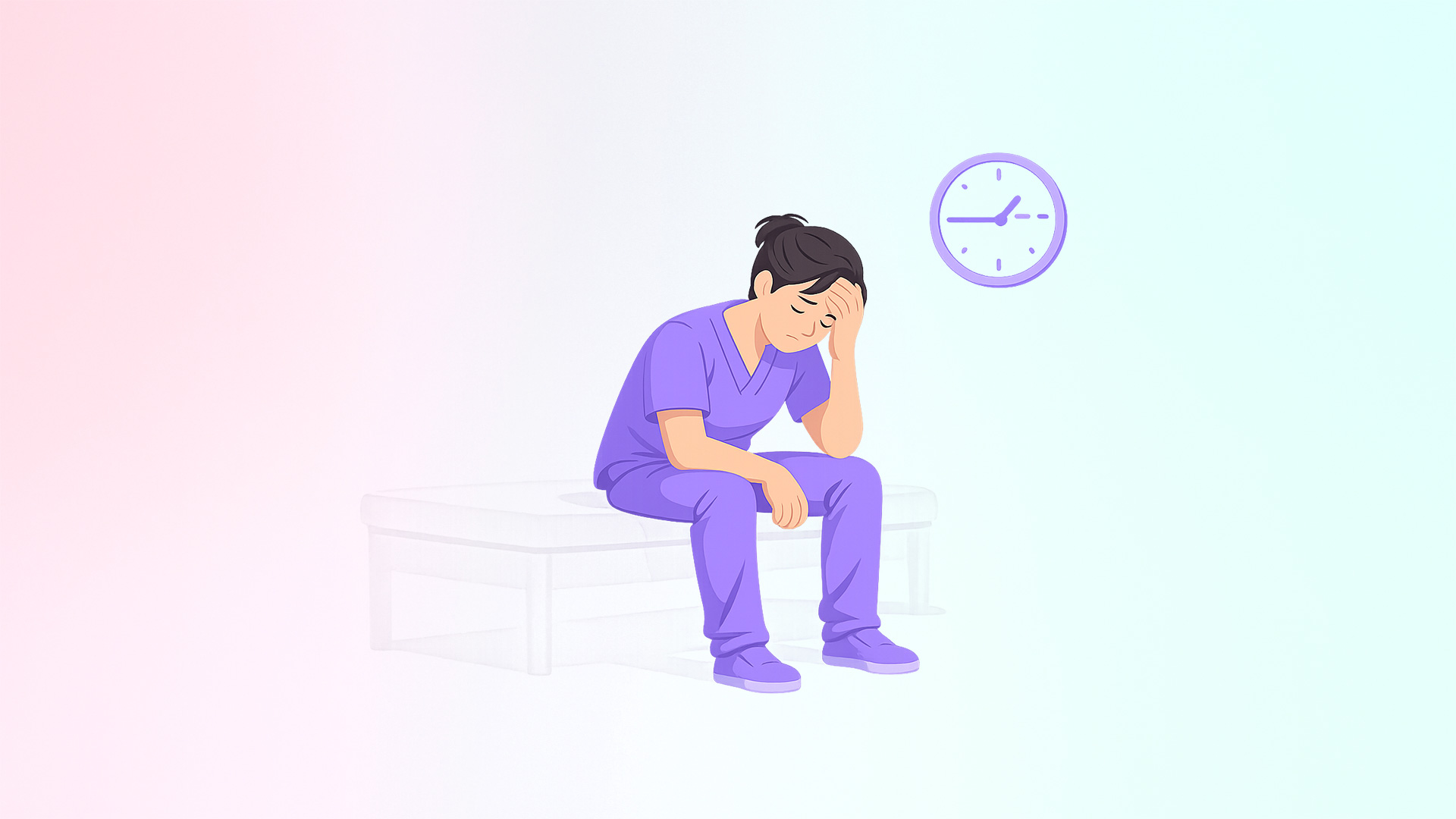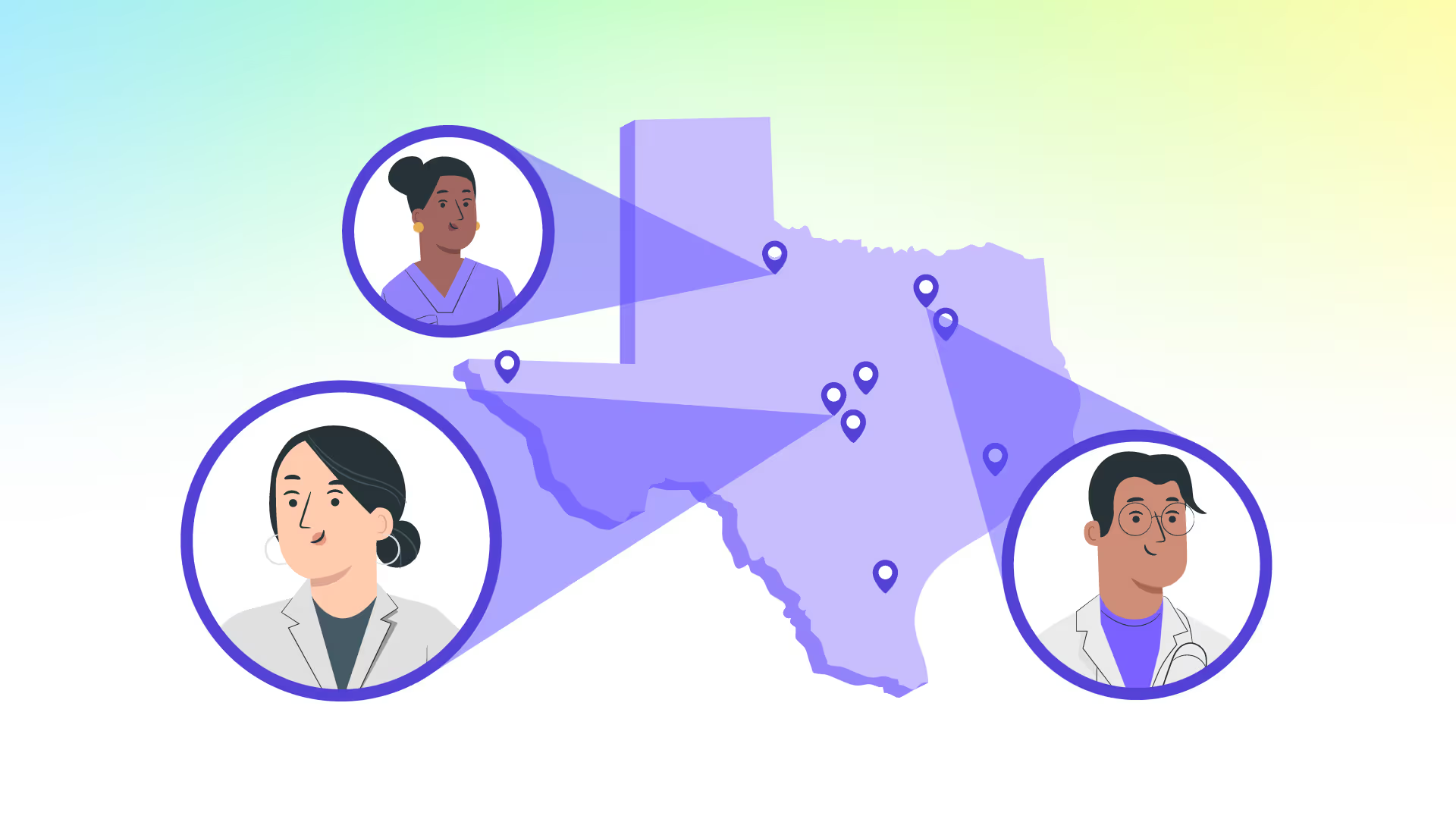The best way to find telehealth PMHNP preceptors is to combine targeted outreach with a clear understanding of your school and state requirements. Students who prepare professional materials, contact the right providers, and focus on telehealth practices already delivering psychiatric care are more likely to secure placements that count toward graduation and build essential clinical skills.
TL;DR – How to Find Telehealth PMHNP Preceptors
- Telehealth PMHNP preceptors count toward your required clinical hours and are widely accepted as legitimate clinical practice.
- 72% of NP students now complete at least part of their clinical practicum through telehealth, gaining real skills in psychiatric interviews, medication management, and differential diagnosis.
- Finding a preceptor on your own is challenging—most telehealth providers don’t advertise student slots or have onboarding systems.
- Success in telehealth practicums depends on key skills: digital confidence, strong virtual communication, decision-making with limited data, and professionalism.
- NPHub connects NP students with vetted telehealth PMHNP preceptors, ensuring school compliance, handling paperwork, and securing high-quality rotations that prepare you for professional success.
Telehealth PMHNP Preceptors: A Critical Piece of Your PMHNP Journey
Finding telehealth PMHNP preceptors has quickly become one of the biggest challenges in nursing education today.
For PMHNP students, securing a qualified preceptor is a critical component of completing their clinical practicum, gaining hands-on experience, and developing the clinical skills that link academic theory to real-life patient care.
Without the right clinical placements, students risk delayed graduation, unmet program requirements, and missed opportunities to gain practical experience in psychiatric mental health settings where they learn to conduct initial psychiatric evaluation appointments, complete psychiatric interviews, and build the assessment skills required to provide excellent mental health care.
This matters because the mental health care sector faces both a shortage of providers and growing demand for high-quality clinical experiences and for aspiring psychiatric mental health nurse practitioners, a telehealth preceptor doesn’t just provide practical training; they offer an invaluable platform where students develop confidence, acquire experiential knowledge, and practice novel clinical skills that prepare them to achieve professional success.
In this blog, we’ll break down what telehealth PMHNP preceptors are, why they’re becoming so important in today’s clinical environment, the skills and strategies that help students stand out, and, most importantly, how to actually find one.
What is a Telehealth PMHNP Preceptor?
A telehealth PMHNP preceptor is a licensed psychiatric mental health nurse practitioner (or another qualified provider) who supervises nurse practitioner students in a virtual clinical setting.
This model is considered parallel to in-clinic teaching, applying the same standards of supervision and learning outcomes in a digital format. Preceptors ensure students develop clinical skills while also adapting to telehealth-specific requirements such as professional etiquette, charting in electronic health records, and safe digital communication and under their supervision, PMHNP students learn to:
- Apply diagnostic assessment and screening tools to identify psychiatric conditions and track treatment response.
- Manage psychopharmacological and psychotherapeutic treatments, including medication-assisted treatment (MAT) for substance use disorders.
- Deliver telepsychiatry-based care, building communication, cultural humility, and adaptability in remote patient interactions.
- Integrate academic theory with clinical practice by collaborating with preceptors and interdisciplinary teams in both virtual and outpatient clinical settings.
Because psychiatric mental health care translates effectively to remote delivery, telehealth preceptors provide an invaluable platform for students to gain experiential knowledge, apply theoretical knowledge to real-life healthcare scenarios, and prepare for professional success in today’s mental health care sector.
The challenge, of course, is that while these preceptors are essential, they are also difficult to find. Most students spend months emailing practices that don’t advertise placements or aren’t set up to onboard learners virtually. That’s where we step in. At NPHub, our role is to bridge that gap, connecting PMHNP students with vetted telehealth preceptors who meet their program’s requirements.
This way, you don’t lose time in a frustrating search, and you can stay focused on building the clinical skills that matter. If you’re ready to move forward with confidence, you can create your free account and start the process of securing your placement.
Why Choose Telehealth for Your PMHNP Preceptors?
Telehealth is no longer an emergency backup option, it has become a permanent part of the mental health care sector. For PMHNP students, choosing a telehealth preceptor isn’t just about convenience; it’s about preparing for the realities of modern practice.
Clinical practicums form a critical component of every NP program, and telehealth offers a path to meet those required clinical hours while building skills that will remain central throughout your career. There are several reasons telehealth clinicals stand out:
- Flexibility that supports students’ lives: Remote rotations allow students to balance coursework, employment, and family without the stress of long commutes.
- Exposure to diverse patient populations: Working with patients in rural or underserved areas helps students gain practical experience and a broader view of real-life healthcare scenarios.
- Preparation for modern psychiatric care: Much of today’s psychiatric mental health treatment, including initial psychiatric evaluation appointments, follow-up sessions, and medication management, is already delivered virtually.
- High-quality, immersive learning: Students still practice assessment skills, refine differential diagnosis, and gain hands-on experience with EHR documentation, just as they would in person.
Telehealth practicums don’t replace traditional in-person training; they complement it. And while some students still question if teleprecepting “counts,” the data shows it’s already a proven model. Next, we’ll see just how widely it’s being used and the skills you’ll need to succeed in it.
Must-Have Skills to Stand Out in a Telehealth Rotation
Many students wonder if telehealth precepting “counts” toward their clinical practice requirements. The evidence shows it does. Before 2020, fewer than 2% of nurse practitioner students had access to a teleprecepting experience. Within just seven months, that number rose to 72% of NP students (including PMHNPs) completing their clinical practicums through telehealth.
Students successfully met their required clinical hours, conducted psychiatric interviews, and built the assessment skills required to deliver excellent mental health care in a virtual setting.
What made this shift successful was not only the format, but the skills students brought to it. Telehealth PMHNP preceptors expect learners to come prepared with the competencies that make remote care effective. Among the most critical are:
- Digital confidence: Comfort navigating HIPAA-compliant video platforms, EHR systems, and virtual intake tools.
- Precision in virtual communication: The ability to build trust, ask focused questions, and show empathy without physical presence.
- Clinical decision-making with limited data: Making sound judgments even when vital signs or physical exams aren’t available.
- Professionalism in remote settings: Maintaining confidentiality, punctuality, and a professional presence—even when working from home.
For students, the challenge is not whether teleprecepting works (it clearly does) but how to find a preceptor who will both provide these opportunities and guide them in building these skills.
That’s exactly what we focus on at NPHub. Start your free account with us and get matched with a telehealth PMHNP preceptor who will not only meet your program’s requirements but also help you strengthen the skills that set you apart in practice.
Step-by-Step: How to Find Telehealth PMHNP Preceptors
Even with proof that teleprecepting works, the hardest part for most students is still the preceptor search. Unlike traditional clinics, telehealth practices rarely advertise student placements or have structured onboarding. That means PMHNP students often spend months cold-emailing and calling, only to end up delayed in their programs.
Here’s a more detailed, practical approach to finding a telehealth PMHNP preceptor:
1. Confirm school and state requirements
Before you invest time reaching out to providers, verify that your school accepts telehealth clinical hours and review your state’s regulations around cross-state supervision. Some states allow students to work with a preceptor licensed in a different state, while others require local licensure. Clarifying this early helps you avoid wasted efforts on placements that won’t be approved.
2. Target the right providers
Not every mental health provider is positioned to take students. Your best prospects are psychiatric mental health nurse practitioners, psychiatrists, or telehealth practices that already deliver initial psychiatric evaluations, follow-up sessions, and medication management virtually. Outpatient practices and virtual-first clinics are often more open to students than hospital systems, which may have stricter onboarding rules.
3. Prepare your materials in advance
A professional approach can make or break your outreach. Have your CV, liability insurance details, school paperwork, and practicum requirements ready to send on request. Providers are more likely to respond to students who demonstrate organization and professionalism. Think of it as an interview process—if you show up prepared, you stand out from the dozens of vague requests providers receive.
4. Use professional networks effectively
LinkedIn, nursing associations, and alumni networks are underused tools for clinical placement. Instead of sending generic messages (“Do you take students?”), engage with providers’ posts, ask thoughtful questions, and demonstrate genuine interest in their work. Building rapport before asking for a placement increases your chances of a positive response.
5. Be specific in your request
When you reach out, clarity matters. Outline the number of clinical hours you need, your program’s requirements, your preferred timeline, and what you’re hoping to learn (e.g., gaining confidence in psychiatric interviews, strengthening differential diagnosis skills, or exposure to non-pharmacological interventions). This not only shows professionalism but also helps preceptors see how they can structure your experience effectively.
6. Stay organized and persistent
Searching for a preceptor is rarely successful after one or two emails. Create a simple spreadsheet to track who you’ve contacted, when you followed up, and what the response was. Consistent, professional follow-ups can turn an initial “no response” into a “yes.” Persistence often makes the difference between securing a placement and delaying graduation.
Following these steps won’t guarantee a preceptor, but it will save time, prevent common mistakes, and make you a stronger candidate. Still, the reality is that even with the best strategy, many students end up empty-handed, simply because most telehealth practices don’t advertise openings or have the capacity to onboard students.
When persistence and preparation aren’t enough, it doesn’t mean you’ve failed. It means the system is stacked against you. That’s where Preceptor matching services designed specifically for NP students can make all the difference. In the next section, we’ll look at how NPHub simplifies the process, helping students connect directly with vetted telehealth PMHNP preceptors so they can stay on track toward graduation.
The Smarter Way to Secure a Telehealth PMHNP Preceptor
For many nurse practitioner students, the frustration isn’t about effort, it’s about the system. You can spend months on your preceptor search, reaching out to clinics and providers, only to hear nothing back.
Telehealth practices rarely advertise student opportunities, and when they do, they often lack the structure to support a clinical practicum. The result? Delayed clinical rotations, extra tuition, and unnecessary stress.
At NPHub, we simplify this process by connecting PMHNP students directly with vetted telehealth PMHNP preceptors who are approved and ready to teach. Instead of trial and error, you gain access to an invaluable platform designed to ensure that every hour you complete is accepted and every skill you practice is relevant to today’s mental health care sector.
Here’s what sets our approach apart:
- Vetted telehealth PMHNP preceptors: We don’t just hand you a list—we connect you directly with licensed preceptors who have already been approved to teach NP students. Each provider is reviewed for availability, specialty fit, and willingness to precept, so you know your match is reliable.
- Clinical placements that count: Every rotation we set up is confirmed with your school from the start. That means your clinical hours won’t be wasted on a site that gets rejected later, and you stay on track for graduation.
- Paperwork and coordination handled: From site agreements to liability insurance forms, we manage the logistics that usually take students weeks or months to resolve. Our team ensures compliance with your program’s requirements so you can focus on building your clinical skills.
- A streamlined path to graduation: With our network of telehealth PMHNP preceptors, you gain more than access—you gain peace of mind. We help you secure a rotation where you can practice psychiatric interviews, strengthen differential diagnosis, and build confidence in medication management, all while meeting your school’s criteria.
Instead of chasing emails and hoping for replies, you can spend your time strengthening your clinical skills, gaining experiential knowledge, and preparing to treat patients confidently across all settings.
With the right telehealth PMHNP preceptor, your clinical placements stop being a barrier and start being the critical component that links your didactic education with the realities of psychiatric mental health care.
If you’re ready to move past the uncertainty, you can create your free account and secure a placement that doesn’t just check the box for graduation but actually prepares you for professional success in a changing healthcare landscape.
From Search to Success: Finding the Right Telehealth PMHNP Preceptor
Finding telehealth PMHNP preceptors is one of the most challenging parts of an NP student’s journey, yet it’s also a critical component of completing your program.
As schools increasingly recognize telehealth as valid clinical practice, students now have the opportunity to gain hands-on training in virtual settings that reflect the future of psychiatric mental health care.
The challenge isn’t whether teleprecepting works, it does. The challenge is navigating the preceptor search on your own without losing time or delaying graduation. That’s why NPHub exists: to bridge the gap between NP students and nurse practitioner preceptors who can provide the high-quality clinical experience and individualized guidance needed to succeed.
Don’t let months of unanswered emails derail your progress. Go to NPHub, create your free account, and match with a vetted telehealth PMHNP preceptor who will help you complete your clinical hours on time, graduate and prepare you for professional success.
Frequently Asked Questions Finding Telehealth PMHNP Preceptors: Guide for NP Student
1. Do telehealth PMHNP preceptors count toward my clinical hours?
Yes. Most nursing programs now accept telehealth clinical practicums as valid, as long as they meet your school’s requirements. Always confirm with your coordinator before beginning.
2. How does a telehealth PMHNP rotation compare to an in-person clinical?
Telehealth rotations focus more on psychiatric interviews, assessment skills, and medication management, while in-person clinicals often emphasize physical exams and procedures. Both are valuable, and many students benefit from combining the two.
3. What skills will I gain from working with a telehealth preceptor?
You’ll strengthen differential diagnosis, practice medication management, improve virtual communication, and gain experience conducting initial psychiatric evaluations. These are essential for modern psychiatric mental health practice.
4. How many clinical hours can I complete in telehealth?
The number varies by school and state. Some programs allow all required clinical hours to be completed virtually, while others cap the percentage. Always check early to avoid wasted time.
5. How hard is it to find a telehealth PMHNP preceptor on my own?
Telehealth providers don’t advertise student slots or have onboarding systems, meaning students often face months of unanswered outreach before finding a match.
6. What’s the difference between finding a preceptor on my own and using NPHub?
On your own, you handle cold calls, paperwork, and site approval with no guarantees. With NPHub, you’re matched with vetted preceptors and we manage coordination, ensuring your clinical practice counts.
7. How much does it cost to use a service like NPHub?
Costs vary depending on your rotation needs and location. Most students view it as an investment since it saves time, avoids delayed graduation, and ensures a high-quality clinical experience.
8. Is teleprecepting considered “less real” than in-person training?
No. Research shows teleprecepting provides the same learning outcomes in clinical knowledge and assessment skills required. It prepares students for today’s mental health care sector, where telehealth is widely used.
9. What should I prepare before reaching out to a preceptor?
Have your CV, insurance, school forms, and rotation requirements ready. Being prepared shows professionalism and makes it easier for a preceptor to say yes.
10. Can NPHub help me find telehealth PMHNP preceptors specifically?
Yes. We have a network of telehealth nurse practitioner preceptors already vetted to provide individualized guidance. We confirm school approval and handle logistics so you can focus on gaining hands-on experience.
Key Definitions: Telehealth PMHNP Preceptors and Clinical Placements
- Telehealth PMHNP Preceptor
Licensed psychiatric mental health nurse practitioners (or psychiatrists) who supervise NP students in virtual clinical practicums, guiding them through patient care in a remote setting. - Clinical Practicum
A supervised training experience where nurse practitioner students apply academic theory in a real-world clinical environment to meet required clinical hours. - Initial Psychiatric Evaluation Appointment
A patient’s first visit with a provider, where the PMHNP student learns to gather the patient’s chief complaint, complete a psychiatric interview, and begin developing a differential diagnosis-based plan. - Medication Management
A core PMHNP skill where students learn to prescribe medications, monitor side effects, and integrate non-pharmacological interventions to ensure excellent mental health care. - Differential Diagnosis
The process of ruling out conditions with overlapping symptoms (e.g., depression vs. bipolar disorder) to arrive at the correct diagnosis—a critical component of psychiatric mental health training. - Experiential Knowledge
The practical insights students gain during clinical rotations, where hands-on training links classroom learning with real life healthcare scenarios. - Individualized Guidance
Mentorship provided by nurse practitioner preceptors, ensuring that NP students not only meet program requirements but also develop novel clinical skills tailored to their growth.
About the author
- NPHub Staff
At NPHub, we live and breathe clinical placements. Our team is made up of nurse practitioners, clinical coordinators, placement advisors, and former students who’ve been through the process themselves. We work directly with NP students across the country to help them secure high-quality preceptorships and graduate on time with confidence. - Last updated
October 1, 2025 - Fact-checked by
NPHub Clinical Placement Experts & Student Support Team - Sources and references
- https://www.ama-assn.org/practice-management/scope-practice/put-focus-real-fixes-america-s-mental-health-care-shortage
- https://journals.lww.com/jaanp/Fulltext/2022/01000/Teleprecepting__A_timely_approach_to_clinical.22.aspx
- https://pmc.ncbi.nlm.nih.gov/articles/PMC9760220/pdf/main.pdf
- https://www.nphub.com
- https://www.nphub.com/find-preceptors
- https://www.nphub.com/testimonials
- https://www.nphub.com/np-student-coordinators
- https://www.nphub.com/rotation-paperwork-process
Find a preceptor who cares with NPHub
Book a rotation.webp)








.webp)


.webp)



%20(3)%20(2).svg)
.webp)